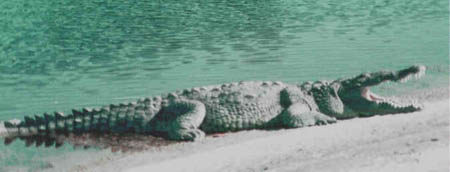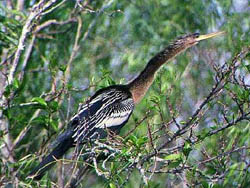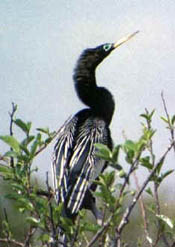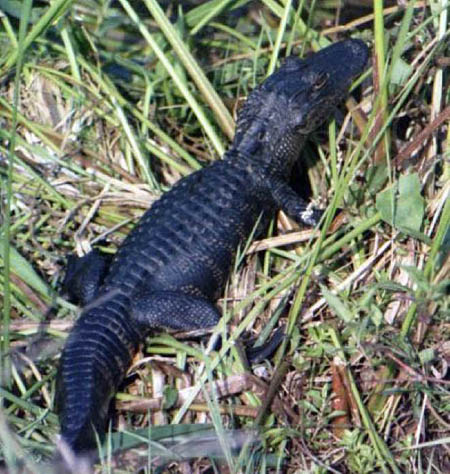|
Canoeing in the Everglades
Perched on the southern tip of the Florida peninsular is a land of watery beauty. This tropical Eden was once inaccessible to all but the hardiest travelers. Today, we can drive our RVs into this giant 'river of grass' and enjoy its beauty in comparative luxury. We can sit in our motor homes and watch the sun's golden orb descend into the pewter waters of Florida Bay. We can stand by our barbecue pit and watch great flocks of white winged water birds swirl overhead. However, to come to know this vast ecosystem, we must leave the pavement behind and step into the real Everglades.
Sure, we might get our feet wet and muddy. We might experience a few mosquito bites. However, the reward of watching one of the few remaining American Crocodiles bask in the sun or experiencing the thrill of meeting a deer face to face is worth it. Who knows, we might even spot an elusive Florida Panther deep in a hardwood hammock.
 One of the Everglades few crocodiles
When we think of The Everglades, most of us think of the National Park located there. However, the park comprises only about one fifth of The Everglades. It's designed to help protect at least a part of it.
Flamingo Campground is the most popular of the campgrounds, probably because it's the southern most campground in the continental United States. Located on Florida Bay, it has 234 drive-in sites as well as walk-in and group sites, rest rooms, two dump stations, a restaurant, a post office, laundry facilities, a general store, marina, a visitor center/museum, public telephones and cold showers. However due to hurricane damage from Katrina and Wilma, parts of the campground, the lodges and cabins as well as the restaurant and cafe are closed. The park management is working on this currently so they may be reopened by the time you read this. Check before you go.
 
Female (left) and male Anhinga (right)
The waterways have always been the biggest attraction here. You can enjoy anything from a short canoe or kayak trip to fully equipped houseboat rentals. The bay or back country cruises are great ways to explore the waterways. On the backcountry cruises you may spot a sunning crocodile. There are only a few hundred of these endangered reptiles left. The southern tip of Florida is the only place in the U. S. they can be found. Be on the lookout for many varieties of birds, hawks, herons, terns and dozens of others. An alligator sighting is almost a given. These once endangered creatures abound.
 A young alligator basks in the sun
The bay cruises, either the sunset sailing cruise or the four-hour Dolphin Cruise, are a place to spot dolphins, pelicans, ibis, egrets and numerous other birds. The dolphins are natural hams. They love to perform and the more you clap and cheer, the more they will entertain you. Just below the surface, you often spot Manatees drifting in the clear water.
The marina offers docking for your own boat and fuel, as well as rentals from canoes to fully furnished houseboats.
Long Pine Key near the main entrance has 108 drive-in sites and one group site. It has rest rooms, water, a dump station and a phone. There are no hook-ups at any park sites.
Chekika Campground has been closed to campers since Hurricane Irene in October 1999. It is open for day use.
You can reserve a site November through April by calling 800-365-CAMP. Camping is limited to 14 days in the park during winter and 30 days per year. Current prices are $14 per day in winter, free from June to August. (If you come in the summer, bring a saddle. The mosquitoes are large enough to ride and very hungry.)
Take advantage of the numerous ranger led activities. For the braver of you, a sunset canoe trip or Slough Slog brings the swamp to life in a new way. There are dozens of ranger led programs for kids or grown ups. For information on current activities, check at one of the visitor centers, Ernest F. Coe at the entrance, Flamingo Visitor Center at that campground and Royal Palm Visitor Center, midway between the entrance and Long Pine Key.
 A Everglades rookery
For bird watching or just getting away from it all, the many hiking trails boardwalks or ponds are a perfect place to stretch out those highway kinks. Eco Pond, near Flamingo, sports flocks of wading birds nesting in the trees like so many giant cotton bolls.
Paurotis Pond is a rookery area for Wood Storks and a possible place to spot Roseate Spoonbills. Mrazek Pond and Nine-Mile Pond also are good places for birding. If you really want to see one of the rare Flamingos, try Snake Bight Trail.
For nature at its best, Anhinga, Gumbo Limbo and Mahogany Hammock Trails offer you a chance to observe plant and animal life.
The 'Don't Miss' spot is Shark Valley. Your $10 admission ticket to the park will get you into here also. If you only visit Shark Valley, off Highway 41 on the north end of the park, it will cost you $8 admission. You can take a wildlife-viewing tram, rent a bike, or just walk. Shark Valley is the best locale in the park for photographing wildlife. I once observed people clustered around a 14-foot alligator sunning on the pavement there. Suddenly he stirred. You won't believe how fast people can move. Incidentally, you are not allowed closer than 25 feet and feeding wildlife in the park carries a stiff fine. Be especially careful with small children and dogs. Children are closer to the size alligators recognize as prey and dogs fit in the hors-d-oeuvre category.
When you begin to feel like Crocodile Dundee, Miami with all its glitz and glamour is just a hop, skip and jump away. You can enjoy all the civilization you desire there.
For more information on the Everglades and Miami area:
www.miamiandbeaches.com
http://www.nps.gov/ever/
|